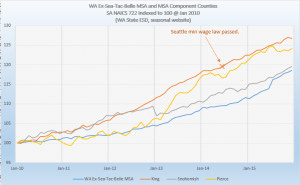@TBPInvictus here:
If you’ve been paying attention to the ongoing minimum wage debate, there have been some recent developments.
The Washington Post gave some column inches to Mark Perry, who’s been trumpeting absolutely worthless “data” about Seattle for over a year now. In his WaPo piece, which was ostensibly about Walmart, Perry claims:
The stories collected from west coast cities that have pursued wage mandates approaching this level — including Seattle, San Francisco, and Oakland — show that significant price hikes, employee layoffs and business closures should be anticipated and expected.
I’ve not been paying too close attention to San Fran or Oakland, but Perry’s claim about Seattle is wholly without any support or merit, as we’ll examine a bit below.
Media Matters immediately took Perry to task:
The misleading op-ed came after years of research by economists debunking the claim that raising the minimum wage kills jobs, and The Post gave a platform to biased researchers who had been discredited on this specific issue. Perry has attacked minimum wage increases in Seattle by cherry-picking data to falsely suggest that Seattle lost jobs after it raised its minimum wage. Meanwhile, [co-author] Saltsman and the Employment Policies Institute are tied to low-wage industries that actively lobby against raising the minimum wage.
The Economist weighed in with a slight nod to higher minimum wages, writing that “minimum wages, set carefully, are beneficial—perhaps even for the firms who pay them.” With regard to Walmart, they wrote (emphasis mine):
The firm says that wage costs are not to blame. The closures mostly reflect Walmart’s wholesale abandonment of its small “Walmart Express” stores. Elsewhere, Walmart hired 8,000 new department managers at the same time as raising pay. Adding middle-management is hardly the hallmark of a firm set on trimming its labour force (though some say hours have been cut instead).
Back to Professor Perry, who has relentlessly flogged the Seattle-Tacoma-Bellevue Metropolitan Statistical Area (MSA) as a proxy for the city of Seattle proper. I have exposed this sleight of hand numerous times; see here for one good primer on how deceitful Perry is being.
Unfortunately, we can only get good data on the city of Seattle proper every five years, from the Economic Census. That said, the fact that we don’t have high frequency data for the city of Seattle itself does not give one license to abuse other, more readily available data.
The Sea-Tac-Belle MSA is comprised of three counties – King (in which resides Seattle), Snohomish, and Pierce. What Perry could do – but is too lazy to – is examine the component counties as a way of drilling just a bit closer to the truth. However, when you don’t really care about the truth, but only your narrative, that’s not something you’re likely to do.
Now, I’m not going to claim that even looking at King County will give us an accurate read on what’s happening in Seattle. Even King County itself, to say nothing of the MSA, is too big – in both population and geography – to be a wholly reliable indicator. But looking at the tri-county components is informative.
WA state food jobs are booming outside Seattle MSA, where restaurant hiring stalled last year. Just a coincidence? pic.twitter.com/UC5zook88W
— Mark J. Perry (@Mark_J_Perry) January 29, 2016
Perry is fond of running the Tweet above, which references the “Seattle MSA,” a misnomer in itself.
In fact, if we look at NAICS 722 jobs (Food Services and Drinking Places) in the component counties of the Sea-Tac-Belle MSA (King, Pierce, and Snohomish Counties), along with the rest of the state exclusive of those three, this is what we see:
The chart above shows the three counties of the Sea-Tac-Belle MSA broken out, along with the state of Washington ex- those three counties. I’ve put a marker at the point in time – June 2014 – when Seattle’s minimum wage law was passed. Do you see any indication said law’s passage has had a deleterious effect on NAICS 722 jobs in the county? Neither do I. The problem, to the extent there is one, appears to be in Pierce County.
I’ll reiterate that even King County is an imperfect proxy for the city of Seattle, but it’s better than looking at the MSA, as Perry deceitfully insists on doing. In short, as I’ve repeatedly documented, there are no data out there right now to indicate that the city of Seattle has had any problem whatsoever coping with its new minimum wage. In fact, the available data tell the opposite story. Full stop.


